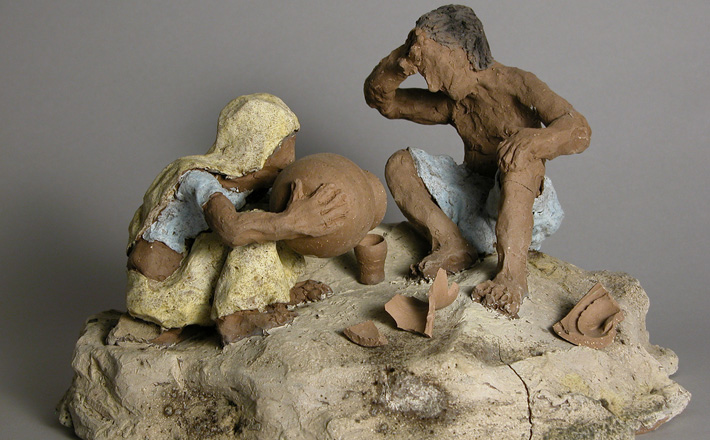Commentary on Romans 5:1-11
In the previous four chapters, Paul has spent intense time trying to explain what he means by righteousness.
In essence, Paul has described righteousness as God’s character — he first uses the word in Romans by qualifying it with “of God” (Romans 1:17). God has revealed God’s character – “righteousness of God” — in the Gospel. And revealed it through faith for faith.
At the beginning of chapter 5, Paul starts with the word dikaiothentes — having been justified/made righteous. The word is a participle in the passive voice. Paul is talking about the circumstances of the lives of believers — they are those who have been justified, made righteous. (The word dikaosune, which is the word in the phrase “righteousness of God,” is one Greek word which has two English translations: righteousness and justice.
The same word is the root of the word dikaothentes in 5:1). And this has happened to them; they are the recipients of this.
Paul makes plain that he wants the statement in 5:1 to be understood in the context of what has gone before. “Therefore,” Paul says, “having been made righteous.” Paul is saying, in light of what I have said to this point, I say that the state of affairs we share — you Roman Christians and I — that state of affairs is that we have been justified.
He qualifies what he means by claiming that they have been justified. Paul says we are justified by faith. This comes as no surprise. His whole point in the previous chapter has been to say that this is always the way that justification has happened to God’s people. Even Abraham is justified by faith (Romans 4:3).
Believers in Christ experience the same process of being justified as Abraham — we too are justified by faith. Our most fundamental defining shape is that we have been justified by faith. That being said, that is not all there is to say. One of the things Paul does not let us forget is that the Christian life is a challenging life — it is much more than simply receiving salvation. The Christian life is about growth and transformation. This is what Paul will begin to describe in Chapter 5.
But he has wanted to make sure his hearers (and us) know the starting point for growth and transformation. It is not that we Christians devote ourselves to growing in Christ on the basis simply of personal decision or willpower, or because we recognize that this is valuable and important. Rather, we devote ourselves to growing in Christ on the basis that we have been justified by faith.
This means that we are empowered to grow; empowered not by our own strength of character or personal discipline (although these will come into play), but empowered by God. We have been given a new shape from which to begin the process of transformation. We have been given the shape of the character of God — righteousness.
Our starting point for growth assures our endpoint. We start as righteous and so we will end up righteous. It is similar to being someone who knows how to swim and jumps into the pool at one end and knows — absolutely knows — that she is going to make it to the other end. Why? Because she knows that she is a swimmer.
When the person who does not know how to swim jumps in the pool, she does not know whether or not she will make it very far. She can try and try and perhaps even make it part of the way; but she will do so with fear and expending a lot of her own energy and effort. She has to be a swimmer in order to swim.
Likewise, Paul says that we are justified, we are righteous, and so we will be righteous. In saying this, Paul is not discounting that there is a long way for each of us to travel in becoming righteous — but we are those who know how to become righteous because we have been made fit for righteousness. And we have been made fit for righteousness through faith, and nothing else.
And what does this state of having been made righteous through faith accord to us? First, it gives us peace with God. The fundamental gift of having been made righteous is that we are no longer God’s enemies, we are at peace with God. Paul will go on to speak about how before we were justified, we were God’s enemies (5:10). Now Paul speaks about how we who are justified have peace with God. The enmity, the conflict between humanity and God is over once humans are made righteous.
Why? Because when we are made righteous we are made like God. When we were not righteous, we were sinners (5:8); people whose orientation was to reject God, to abuse God. For Paul, sin is more than transgressing the law; it is more than doing something wrong. Sin is a power that is at war with God. And so humans who are sinners — which is the opposite of humans who are righteous — are under the command of sin. They are soldiers in sin’s army. They are participants in the ongoing battle that the power of sin wages against God.
Once we are made righteous, however, we are on God’s side. We are not enemies of God, we have peace with God.
And how do we have this peace? Through our Lord Jesus Christ. We have this peace not because we bravely decided to change sides in this cosmic conflict between God and sin.
We have this peace because someone made it for us; someone fought the battle on our behalf and freed us from the power of sin and helped us cross to the camp of God. We get to be in God’s camp, in God’s army, if you will, because Christ has brought us there.
Christ is the one who allowed us access to the state of grace we are in. We are recipients of a remarkable gift. We are no longer under the power of sin, we are in God’s home. We have access to God.
Paul is saying that we have gained entrance to the most wonderful place possible — we have gained entrance to God’s domain. And we have done this not because we are worthy of it, not because we have forced our way in, but because Jesus Christ has made it possible for us. To use a Johannine metaphor — Jesus is the door through which we enter. And what we enter is a place of grace.


March 23, 2014